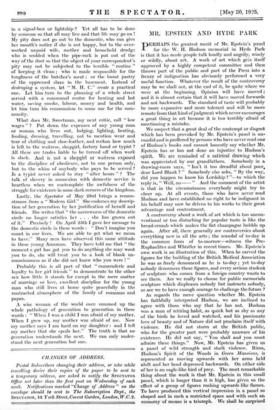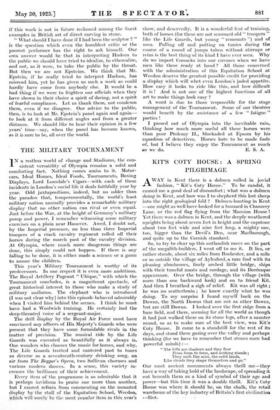MR. EPSTEIN AND HYDE PARK P ERHAPS the greatest merit of
Mr. Epstein's panel for the W. H. Hudson memorial in Hyde Park is that it has made people talk loudly and angrily, wisely or wildly, about art. A work of art which gets itself approved by a highly competent committee and then throws part of the public and part of the Press into a frenzy of indignation has obviously performed a very useful function. Whatever the result of the controversy may be we shall not, at the end of it, be quite where we were at the beginning. Opinion will have moved ; and it is almost certain that it will have moved forwards and not backwards. The standard of taste will probably be more expansive and more tolerant and will be more remote from that kind of judgment which never encourages a great thing in art because it is too terribly afraid of sanctioning a mistake.
We suspect that a great deal of the contempt or disgust which has been provoked by Mr. Epstein's panel is un- candid and is proffered by persons who have never read one of Hudson's books and cannot honestly say whether Mr. Epstein has or has not done an injustice to Hudson's spirit. We are reminded of a satirical drawing which was appreciated by our grandfathers. Somebody in a drawing-room says, " Isn't it too dreadful about poor, dear Lord Blank ? " Somebody else asks, " By the way, did you happen to know his Lordship ? "—to which the reply is, " Well, no " And the comment of the artist is that in the circumstances everybody might try to cheer up. At all events, those who have never read Hudson and have established no right to be indignant in his behalf may now be driven to his works to their great advantage and contentment.
A controversy about a work of art which is too uncon- ventional or too disturbing for popular taste is like the bread-crumb which makes the flat champagne bubble up again. After all, there generally are controversies about everything new in all the arts ; the scandal of to-day is the common form of to-morrow—witness the Pre- Raphaelites and Whistler in recent times. Mr. Epstein's own work is an illustration of this. When he carved the figures for the building of the British Medical Association he was as freely denounced as he is to-day ; yet to-day nobody denounces those figures, and every serious student of sculpture who comes from a foreign country wants to see them. Are we really to choose for public memorials sculpture which displeases nobody but instructs nobody, or are we to have enough courage to challenge the future ?
As regards the mere question whether Mr. Epstein has faithfully interpreted Hudson, we are inclined to agree with those who say that he has not. Hudson was a man of retiring habit, as quick but as shy as any of the birds he loved and watched, and his passionate love of beauty and of Nature did not proclaim itself with violence. He did not storm at the British public, who for the greater part were probably unaware of hii existence. He did not say, " You shall and you must admire these things." Now, Mr. Epstein has given us a panel of wild strength and stark violence. Rima; Hudson's Spirit of the Woods in Green Mansions, is represented as moving upwards with her arms held aloft and her head depressed backwards. On either side of her is an eagle-like bird of prey. The most remarkable thing about the work is that Mr. Epstein in this small panel, which is longer than it is high, has given us the effect of a group of figures rushing upwards like flames. To have produced this vertical impression in a panel so shaped and in such a restricted space and with such an economy ' of means is a triumph. We shall be surprised if this work is not in future reckoned among the finest examples in British art of direct .carving in stone.
" What should I have done if I had been the sculptor ? " is the question which even the humblest critic or the poorest performer has the right to ask himself. Our own answer would be that in interpreting Hudson to the public we should have tried to idealize, to etherealize, and not, as it were, to take the public by the throat. But then we are not Epstein. We think that Mr. Epstein, if he really tried to interpret Hudson, has misread ,him, yet he has given us such a work as could hardly have come from anybody else. It would be a bad thing if we were to frighten our officials when they have shown in their choice a spirit of daring, not a spirit of fearful compliance. Let us thank them, not condemn them, even if we disagree. Our advice to the public, then, is to look at Mr. Epstein's panel again and again- _ to look at it from different angles and from a greater distance. We should like to hear their opinion in a few years' time—say, when the panel has become known, as it is sure to be, all over the world.











































 Previous page
Previous page